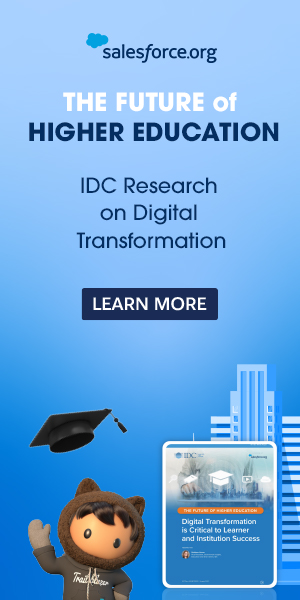Institutions increasingly recognise the crucial role of lifelong learning in rebuilding skills after the pandemic, but how can they engage learners in an equitable way?
An ageing population means academic institutions are adapting their focus to accommodate lifelong learning – whether it’s in the form of microcredentials or stackable courses that match individuals’ career goals.
At a webinar held by Times Higher Education in partnership with Salesforce.org, the panel discussed how lifelong learning and executive education have been affected by the pandemic.
“The challenge is for universities to meet learners where they are,” explained Frédéric Leclère, senior manager of higher education solutions at Salesforce.org. “They want to offer learning options on relevant disciplines that are practical because they’re online, yet encompass elements of social interaction and mentoring.”
Mary Mahoney, director of access and lifelong learning at the University of Wolverhampton and honorary secretary at the Universities Association for Lifelong Learning, acknowledged that the pandemic had accelerated the move to online and blended learning, while also exposing challenges such as learners’ confidence around technology and how to work with local employers. “This is just as relevant now that we’re moving into the endemic stage. For example, Wolverhampton has lifelong learning at its core as it’s an area of economic disadvantage, so we have to start from where the businesses and the learners are,” Mahoney said.
Aniya Iskhakava, director of the learning innovation unit at IESE Business School, said blended learning design in executive and lifelong education needed to focus on “learning moments”. “It’s not about the percentage that is delivered remotely, synchronously or asynchronously; it’s about what leads to employability, or what matches the learning objectives that have been designed into the programme,” Iskhakava explained. While some programmes might be rigid in terms of the number of modules or types of courses required, much executive education could allow greater freedom or curation.
Maintaining student engagement is a more crucial component than ever, according to Leclère. “Students expect something more personalised and to have access to flexible and adaptive learning. But that doesn’t mean everything has to move online,” he said.
Data can help academics and their institutions keep in touch with the people who need greater engagement and to “know them better than before…with the right content that can ensure their success”, Leclère said. For some course cohorts, engagement comes from interacting among themselves, often in informal ways such as via WhatsApp chats. “It’s this blend of elements that creates an engaging learning journey,” Iskhakava said.
Institutions must, however, remain open-minded about how they reach out to students and the blend of remote and in-person learning they offer. Mahoney pointed out that the essential link between executive education and lifelong learning was ensuring equity of access. “It’s easy to assume a particular cohort understands the learning and the particular techniques you use to engage them. But in lifelong learning, the programmes need to embed the capability to help people feel comfortable,” she said.
Growing momentum for professional microcredentials creates opportunities for diversity and inclusion, too. Iskhakava described how learners could choose to work through stackable credentials at their own pace or gather credits to pick up skills for a particular moment in time. “You can reach students you might not have done before because of geography, or more women will join executive programmes because formats are changing. You learn from your audience because you can adapt quicker,” she concluded.
The panel:
- Aniya Iskhakava, director of the learning innovation unit, IESE Business School
- Alistair Lawrence, special projects editor, Times Higher Education (chair)
- Frédéric Leclère, senior manager of higher education solutions, Salesforce
- Mary Mahoney, director of access and lifelong learning, University of Wolverhampton and Universities Association for Lifelong Learning
Watch the session on demand above or on the THE Connect YouTube channel.
Find out more about Salesforce.org.



























